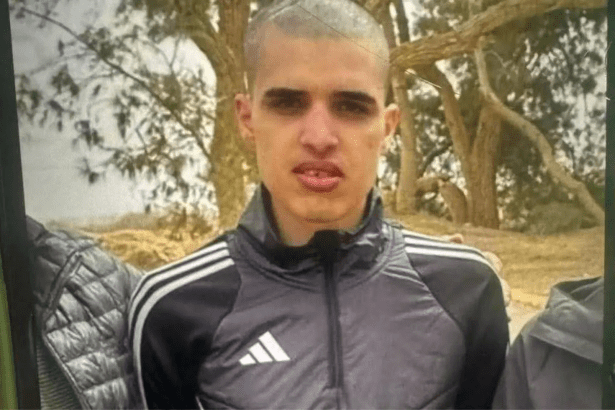Ahmad Manasra was arrested at 13 and kept in solitary confinement for years. He was diagnosed with schizophrenia in prison and was at serious risk of self-harm. His release to a remote location far from his family was Israel’s final act of torture.
by Qussam Muaddi, reposted from Mondoweiss, April 10, 2025
Israeli authorities released Palestinian prisoner Ahmad Manasra, 23, on Thursday after spending ten years in Israeli prison. Imprisoned at the age of 13, Manasra’s case drew international attention due to “legal inconsistencies in his trial, the deterioration of his psychological condition as a result of his cruel arrest and treatment in prison, and denying him treatment,” his lawyer, Ahmad Zabarqa, told Mondoweiss.
Manasra was arrested during the 2015 “Knife Intifada,” a wave of Palestinian stabbing attacks against Israeli forces and settlers carried out by hundreds of Palestinian youth in the West Bank and Jerusalem, and occasionally by Palestinians holding Israeli citizenship. Manasra was involved in an incident where he was accused of “taking part” in a stabbing attack alongside his cousin, Hasan, who was shot dead by Israeli police on the scene.
When arrested, Manasra had suffered a severe injury to his head that caused a skull fracture and cranial bleeding. Video footage of Manasra lying and bleeding on the ground while being yelled and cursed at by Israeli settlers went viral at the time. Another leaked video that circulated widely among Palestinians on social media showed a moment during Manasra’s interrogation by the Israeli intelligence; an interrogation officer screamed at Manasra and attempted to intimidate him into a coerced confession, while Manasra, still a child, replied consistently that he didn’t remember anything and asked to be taken to a doctor.
Manasra’s mental health severely deteriorated in prison over his decade of incarceration. In 2022, Zabarqa pleaded for Manasra’s early release in light of being diagnosed with schizophrenia from being held in solitary confinement. At the time, Zabarqa had told Amnesty International that Manasra’s mental health condition posed “a real danger to his life,” as he had considered committing suicide. The European Union, Amnesty, and the UN also urged Israel to expedite Manasra’s early release, but the Israeli court rejected the petition in June 2022, as he was imprisoned on charges of engaging in “terrorism.”
On Thursday, Israeli authorities released Manasra in a remote location several kilometers from the Israeli prison where he was held in the Naqab desert, where his family was waiting for him at the prison gate. According to his lawyer, Ahmad Manasra was left alone without a phone and was later found and recognized by a Bedouin family, who contacted his family.
“The way Ahmad was released is a continuation of his psychological torture to the last minute,” a spokesperson for the Palestinian Mental Health Network who followed Manasra’s case told Mondoweiss.
“Ahmad suffered a severe deterioration in his psychological condition due to his arrest and detention conditions. He was severely wounded in the head at the moment of his arrest, which caused a skull fracture, and then he was subjected to cruel interrogation,” the spokesperson noted, asking not to be named. “Ahmad was also put in solitary confinement for a prolonged period of time, which worsened his condition, and although the Israeli court allowed him medical visits, it didn’t allow the provision of psychological treatment.”
The spokesperson added that “according to a report we received from Physicians for Human Rights, who last visited Manasra in prison in September 2024, his psychological health is in very difficult condition and he needs urgent treatment.”
“Ahmad needs a gradual, slow integration into social life, which is why he needs to be surrounded by his family,” the spokesperson said. “His healing process begins today.”
Precedent for penalizing Palestinian minors
Manasra’s lawyer, Ahmad Zabarqa, told Mondoweiss that Manasra’s trial had two legal inconsistencies. “First, he was charged with assisting in a murder attempt because he was in the company of his cousin, Hasan, who was killed at the scene by Israeli police and accused of stabbing two Israelis, although Ahmad himself did nothing,” Zabarqa said. “Second, he was below the legal age to be judged as a criminal.”
Zabarqa explained that Israeli law deals with minors under 14 as cases for rehabilitation rather than punishment, which caused the Israeli court to continuously postpone his ruling for months until he was 14. “He was then retrospectively sentenced as eligible for a penal sentence,” he said.
The way the court handled Ahmad’s sentencing then formed a precedent for how Israeli courts would deal with Palestinian minors generally. “It was the first case of its kind,” Zabarqa pointed, “but later, Israeli courts practiced the same tactic of postponing the ruling and sentencing of minors according to their age in multiple cases — and they were always cases against Palestinian minors.”
“Our assessment as lawyers is that the court regarded Ahmad Manasra’s case from a nationalistic point of view, and not a legal one, breaching Israeli law itself,” Zabarqa stressed. “This is a form of discrimination.”
“Ahmad Manasra was submitted to renewed orders of solitary confinement multiple times, adding up to two years of solitary confinement, despite his fragile psychological state,” he added. “Our petition for an early release in 2022 was well-grounded in medical reports, but the court treated it again, in our opinion, from a nationalistic point of view, and not a legal one.”
In April 2022, a short Palestinian film featured the case of Ahmad Manasra as an example of the 105,000 “empty places” left behind by Palestine’s prisoners and martyrs. After Israel’s genocidal assault on Gaza, the pre-October 7 prison population nearly doubled.
Qassam Muaddi is a Palestinian journalist based in Ramallah. He has reported on Palestinian political developments, social movements and cultural issues.
RELATED ARTICLES:
- Israeli forces strip and arbitrarily detain two Palestinian children in the occupied West Bank
- Israel is arbitrarily jailing Palestinian children in record numbers. This must stop.
- Why are there so many Palestinian children in Israeli prisons?
- Detention without charge of Palestinian children hits record level
- Stripped, Beaten, and Blindfolded: ongoing violence and abuse of Palestinian children detained by Israeli military
- Israeli forces raid, shut down Defense for Children & 5 other agencies in West Bank
- A Scarred Childhood: Israeli Attacks against Palestinian Children in the Occupied West Bank in 2022





